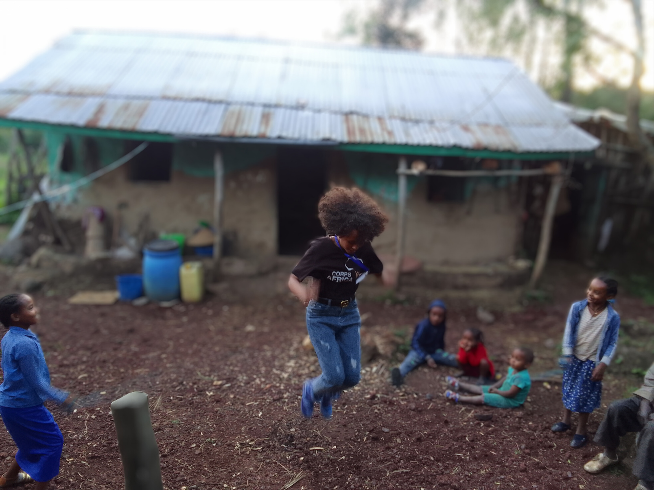Every road has its bumps, and each bump carries a story shaped by unique perspectives. We often hear the word “perspective,” but it truly represents one’s point of view. CorpsAfrica embodies this concept by integrating volunteer trainees into underserved rural communities, giving us a chance to experience firsthand the lives, challenges, and resilience of local people. When I found out I would be assigned to the GOHA rural community for my Pre-Service Training, I approached the experience with an open heart, eager to learn.
When I first met my host mother, an elderly woman exuding warmth and wisdom, my worries melted away. In the Amharic language, we refer to our elders with the respectful term “esachew,” and this lovely lady welcomed me with a radiant smile and open arms, making me feel instantly at home. As the bus carried us to GOHA, I felt a blend of excitement and nervousness. Arriving during the rainy season, I quickly learned to navigate the muddy roads, which became a daily challenge. Just a day after settling in, I joined my host brother in the fields to apply anti-weed chemicals. What struck me was the vast potential of the land and the stark contrast between urban and rural life. While many city dwellers view rural existence as challenging, my host mother’s words resonated deeply: “If you do not thank for what you are given, you will lose what you already hold dear.” The GOHA community, predominantly Orthodox Christians, embodies gratitude in every conversation, finding joy in even the smallest blessings—whether it’s the sun warming their crops or the rain nurturing the soil.
One of the most beautiful aspects of life in GOHA is the sense of belonging. Visiting a neighbor’s home feels like stepping into your own, and hospitality is a cherished value. In contrast to urban settings, where unannounced visits can be frowned upon, everyone is welcomed with open arms. The community’s bilingualism—fluent in Oromifa and Amharic—makes communication effortless, ensuring no one feels like an outsider. My host family shared stories of their lives and culture, while I eagerly shared tales from my hometown, Dire Dawa. Even when I faced an allergic reaction during my first week, their unwavering support reinforced our bond. My experience in the GOHA community serves as a powerful reminder that embracing diversity requires an open mind and a genuine willingness to understand others. As the saying goes, “Be the change you wish to see in the world.”

